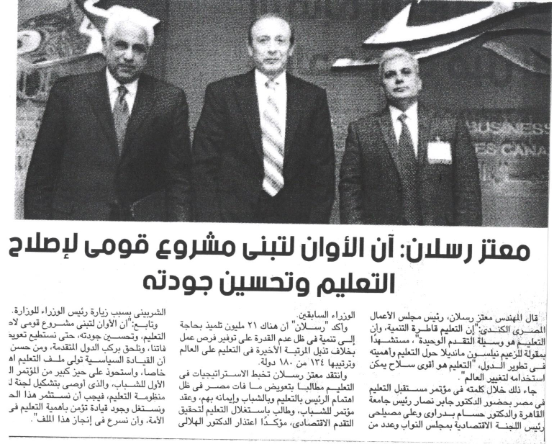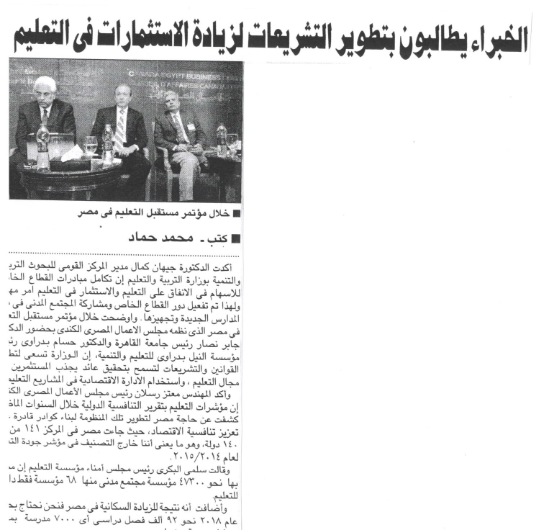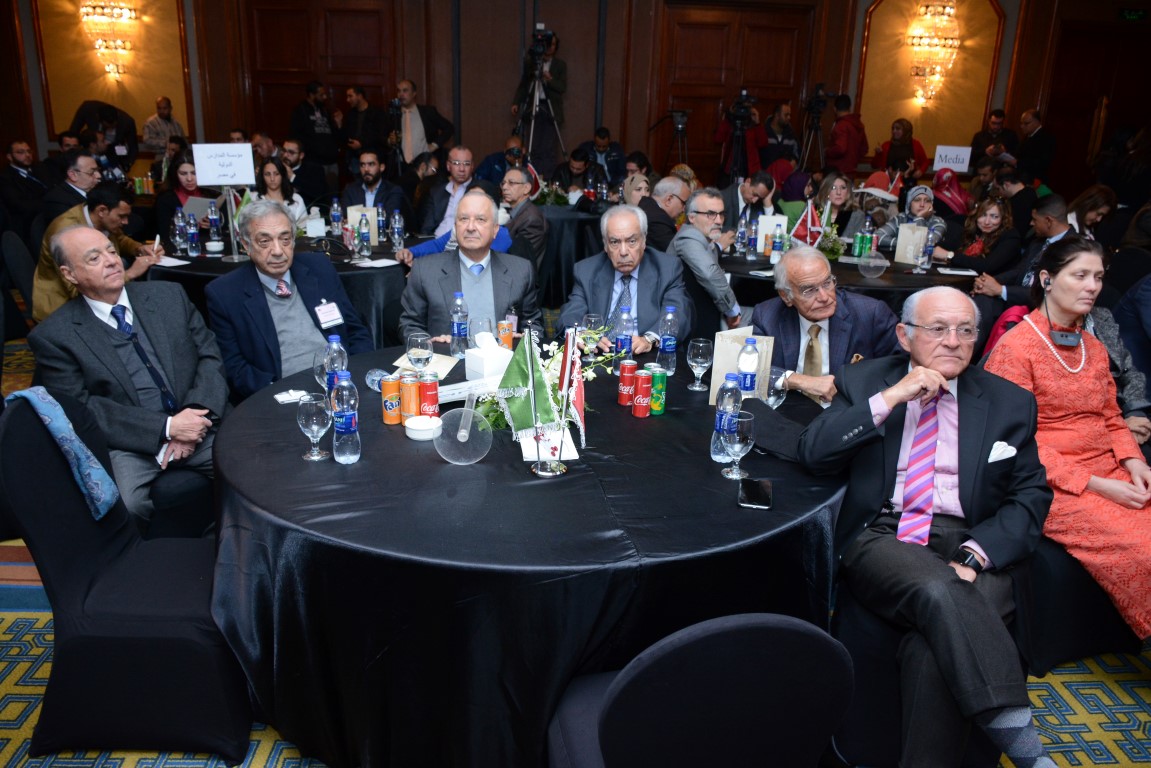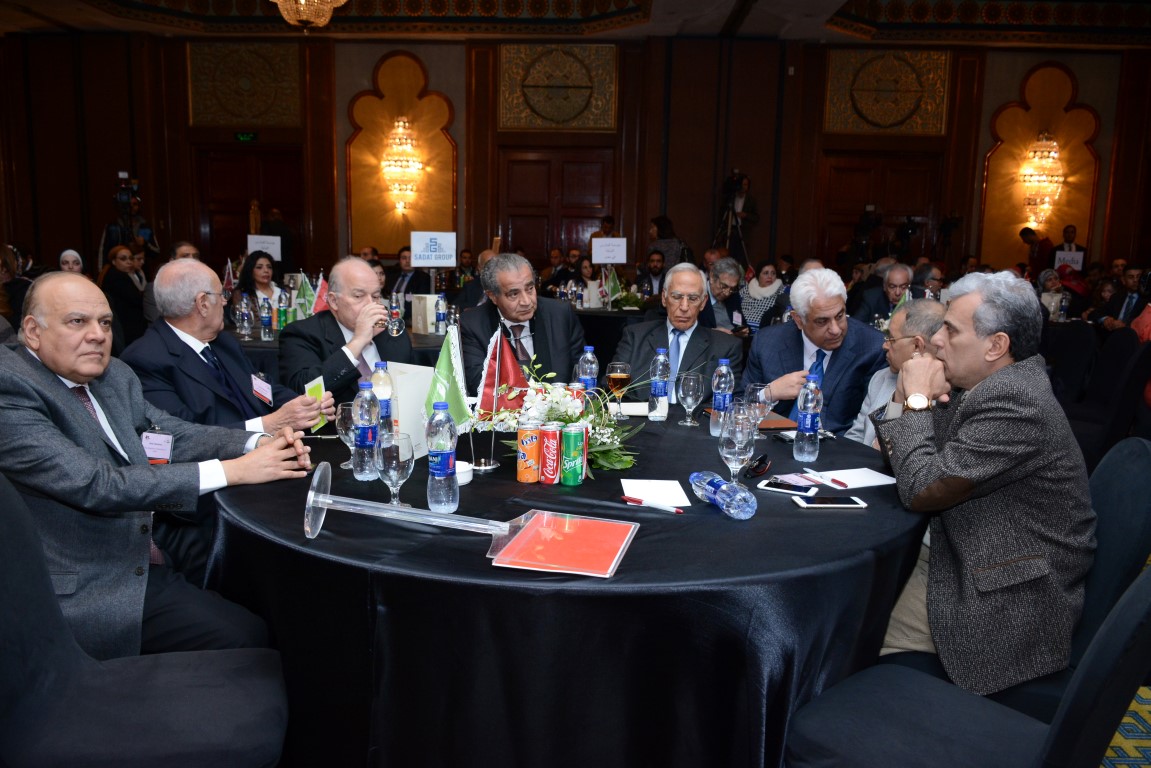
Date
Speaker(s)
Dr. Gaber Nassar
Dr. Hossam Badrawy
Dr. Salma El-Bakry
Mr. Amr Khafagy
Designation
Description
Education is representing the biggest challenge in the development of Egypt ; given the serious repercussions currently facing education, affecting the future of the coming generations, and disturbing the economic and social development plans, it is time to build a national project to reform education and improve its quality to catch up with the developed countries.
In this context, Canada Egypt Business Council & The Egyptian Council for Sustainable Development organized an event with the Ministry of Education and technical education to discuss the topic: “The Future of Education in Egypt”, with the participation of Ms. Gihan Kamal, Mr. Mohamed Saad from the ministry of education, Dr. Gaber Nassar President of Cairo University, Dr. Hossam Badrawy President of Nile Badrawy Institution, Dr. Salma El-Bakry Chairperson of Education First Foundation and Mr. Amr Khafagy Publisher and Editor in Chief at Al Shorouk Newspaper.
In the opening remarks, Eng. Motaz Raslan chairman of Canada Egypt business mentioned that it is time to adopt a national project to reform education and improve its quality, so that we can make up for what we missed and develop the educational system in Egypt. Fortunately, the political leadership gave the educational sector special attention, in the first national youth conference; which recommended the formation of a committee to develop the educational system and take advantage of the presence of a leadership which believes in the importance of education to the nation and to accelerate the completion of this plan.
He then cited a quote which states that: “Education is the most powerful weapon you can use to change the world”, the argument assures that all countries which have made progress and huge spikes in economic, military power or political growth have started with developing education; as since the dawn of humanity until today, international experience has proved beyond any reasonable doubt that the beginning of real progress only starts with education. Eng. Raslan further explained that despite our certainty of this fact, we did not put education on our list of priorities and it was neglected by consecutive governments over the decades. So, we must put it in the priority of the governmental concerns, and remain focused on achieving educational progress as it is known that a lot of problems we are currently facing, whether economic, social or political is the legacy of neglecting education for many years , which negatively affect the youths, as they fall prey to the thought of the extremist, and cause the spread of crime and violence rate.
It was pointed out that the Egyptian human capital amounts for more than 21 million students in pre-university education which can put Egypt in the ranks of the developed countries if there was an appropriate provision of scientific environment and an ambitious education reform program, but it is strange that this human wealth turned from a blessing to a curse when we fail to provide them the adequate housing, health and educational services.
Ms. Gihan Kamal started her speech mentioning that each citizen has the right for education and the new constitution of Egypt ensured proper education to every citizen, so as to consolidate the Egyptian identity, and achieve greater development, she added that the real competition between the countries is in the development of education. Also, the state is concerned with providing crucial mechanisms to offer good quality of educational service to the citizens, the government also is exerting efforts through putting a strategic plan to develop the educational material, technical education , school activities and national schools to promote the Egyptian educational system and take a further step towards sustainable development .
Mr. Mohamed Saad discussed the problem of the huge number of students per class, and said that the ministry is working on increasing and developing the number of classes to 150,000 class where 30,000 have been completed, and 20,000 will be delivered this year; to absorb more students and create a better environment for the students to learn and understand. The ministry is also investing in several projects with the ministry of investment to build 200 new schools in the following 3 years.
Dr. Salma Al-Bakri introduced five ideas to develop the educational system in Egypt, most importantly, the institutions of civil society’s contribution to the development of the educational process, through the adoption of a limited number of schools to develop the learning techniques for students and teachers. Moreover, the educational system in Egypt suffers from several challenges, as the pre-university education which has about 21 million students who are receiving educational services in only 45 thousand schools, from 2 million teachers; which is a real disaster, hurting the sustainable development goals. There are also 37,600 civil society organization in Egypt that provide services in all sectors, from where only 68 institutions provide support the development of the educational sector .
Dr. Hossam Badrawy said that the educational sector in Egypt is facing a number of scenarios where the current situation can remain as it is, or to develop for the following ten years and lose control again, or to invest in a golden opportunity for a change as the world has adopted, especially that all countries of the world are interested in changing educational policies. He also called for the integration of information, education, youth and culture in order to ensure real sustainable development based on enlightenment and integrity.
The floor was opened for questions and answers session, where several ideas, suggestions and strategies were expressed to improve the sector, most of them indicated that the main focus of the educational system should be on the equal distribution of quality as well as on the provision of the quality of education.













